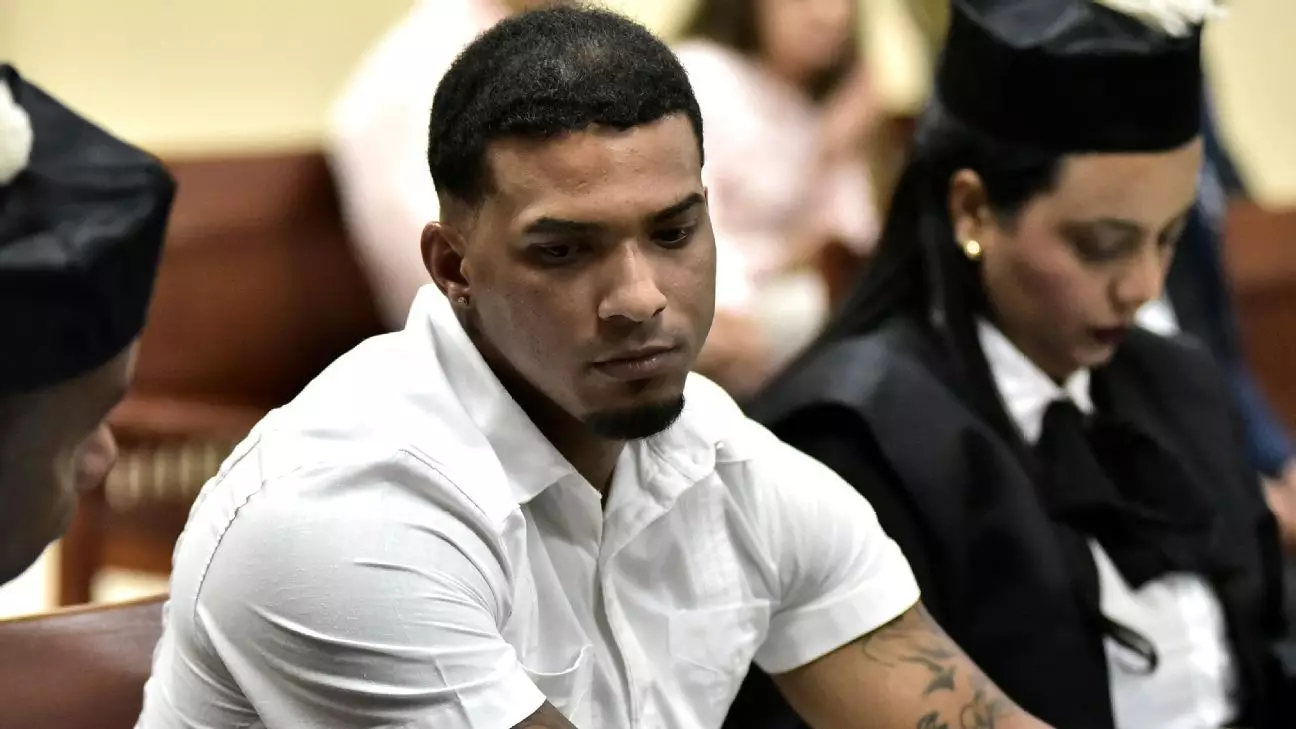Once heralded as one of baseball’s most promising talents, Wander Franco’s rise to stardom was abruptly overshadowed by scandal and serious allegations. Bursting onto the Major League Baseball scene at the tender age of twenty, Franco quickly captured the spotlight as a shortstop for the Tampa Bay Rays. His allure was more than just skill; it was an inspiring narrative of talent meeting opportunity. Yet in a shocking turn of events, Franco has now been classified not merely as a failed athlete but as a convicted sexual offender. His conviction for engaging in a sexual relationship with a minor represents not only a personal failure but also a profound moral and ethical crisis, reflecting the dark undercurrents of celebrity culture that permeate in sports.
The Facts of the Case
Franco was found guilty in the Dominican Republic for maintaining an inappropriate relationship with a 14-year-old girl during a time when he was 21. The court’s decision to impose a two-year suspended sentence raises troubling questions about the accountability mechanisms in place for individuals in positions of power, especially when considering that the girl’s own mother was also convicted of trafficking her daughter. The mother’s ten-year sentence underscores the systematic failures that allow for such egregious abuse to occur within families, and the intertwined fates of these two individuals serve as a grim case study of exploitation.
The enabling of such behavior extends beyond personal culpability; it touches on societal failings that often prioritize profit over protection. The financial motivations that led the mother to engage in trafficking highlight a systemic issue that exists not just in sports, but across various sectors. Franco’s actions were facilitated by a predatory mindset, encapsulated in the way he arranged for the girl’s transport with extravagant means, exposing the unsettling normalization of such exploitative relationships.
MLB’s Response: More Than Just Public Relations
Major League Baseball’s swift response to the allegations, including placing Franco on administrative leave, reflects an institutional effort to address the gravity of the situation. However, the ongoing investigation by MLB, which is likely to enforce additional penalties under its domestic violence and child abuse policy, raises the issue of whether these measures are robust enough. The policy’s existence is commendable, but it remains to be seen how effectively it can hold athletes accountable when they fall from grace. The phrase “punishment fits the crime” resonates here; MLB must consider if mere financial repercussions and conditional sentences are adequate responses to the crimes committed.
Franco’s future within the league now hangs in balance, especially as he battles the practical implications of his conviction. His inability to secure a work visa for the U.S. further complicates matters, leaving his professional career teetering on the brink of collapse. There are real-world implications here, not just for Franco, but also for the Tampa Bay Rays who stand to benefit financially from his tenure while simultaneously grappling with the public relations fallout that comes with such a scandal.
The Broader Implications of Celebrity Scandals
Franco’s case serves as a chilling reminder of the complexities surrounding celebrity culture, accountability, and the politics of sports. The adulation that athletes receive can create a bubble where consequences seem absent. However, Franco’s fall from grace shines a light on the critical need for transparency and rigor in how the sports industry handles allegations, especially those concerning sexual offenses and the protection of minors.
This episode serves to question the integrity of not only the player but also the institutions that allow such behaviors to surface unchecked. Franco’s trajectory illustrates a troubling cycle where marginalized individuals often bear the brunt of exploitation, much like the young girl who became subject to his predatory actions. The narrative does not simply stop at the indictment; it extends into a broader conversation that the sports community must have about safeguarding the vulnerable and ensuring justice is served.
Ultimately, Franco’s once-bright future now flickers dimly, yet it serves as a catalyst for necessary change within Major League Baseball and beyond. The question remains whether this incident will ignite deeper discussions on prevention, awareness, and protection against abuse, ensuring that no one, regardless of their prowess, is above accountability.

